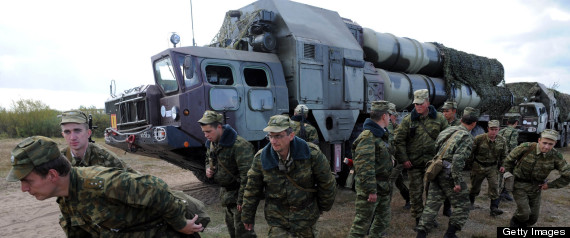Israel has warned the United States that Russia plans to sell sophisticated missile systems to Syria that would complicate any foreign intervention there, the Wall Street Journal reported.
The Journal reported late Wednesday that Israel had provided information to Washington about the imminent sale to Syria of Russian S-300 missile batteries, advanced ground-to-air weapons that can take out aircraft or guided missiles.
Syria has been a close military ally of Moscow for decades, and Russia has blocked international efforts to isolate President Bashar al-Assad's regime over its brutal crackdown on a two-year-old rebellion.
The Israeli report said Syria has been making payments on a 2010 deal to buy four batteries from Russia for $900 million, according to the Journal.
The package includes six launchers and 144 missiles, each with a range of 125 miles (200 kilometers), it said.
The missile batteries would complicate any future effort by the United States or its allies to carry out air strikes against Assad's regime, establish a no-fly zone or intervene to secure and dismantle chemical weapons.
The report comes days after Israel carried out massive air strikes near Damascus, an attack a senior Israeli source said was aimed at preventing the transfer of sophisticated weapons to the Lebanese Hezbollah, an Assad ally.
It also comes as Washington is under mounting pressure to act following reports of the use of chemical weapons by the Syrian regime, which President Barack Obama had repeatedly insisted was a "red line" in the conflict.
Syria's civil war has claimed more than 70,000 lives since the outbreak of an initially peaceful uprising in March 2011, according to UN figures.
US officials could not immediately be reached for comment on the Journal report, but the New York Times cited senior US officials as expressing similar fears about the possibility of an S-300 sale.
US Secretary of State John Kerry is currently in Rome for talks with senior Middle East officials on the Syria crisis and efforts to revive the Israeli-Palestinian peace process.
Original Article
Source: huffingtonpost.com
Author: Agence France Presse
The Journal reported late Wednesday that Israel had provided information to Washington about the imminent sale to Syria of Russian S-300 missile batteries, advanced ground-to-air weapons that can take out aircraft or guided missiles.
Syria has been a close military ally of Moscow for decades, and Russia has blocked international efforts to isolate President Bashar al-Assad's regime over its brutal crackdown on a two-year-old rebellion.
The Israeli report said Syria has been making payments on a 2010 deal to buy four batteries from Russia for $900 million, according to the Journal.
The package includes six launchers and 144 missiles, each with a range of 125 miles (200 kilometers), it said.
The missile batteries would complicate any future effort by the United States or its allies to carry out air strikes against Assad's regime, establish a no-fly zone or intervene to secure and dismantle chemical weapons.
The report comes days after Israel carried out massive air strikes near Damascus, an attack a senior Israeli source said was aimed at preventing the transfer of sophisticated weapons to the Lebanese Hezbollah, an Assad ally.
It also comes as Washington is under mounting pressure to act following reports of the use of chemical weapons by the Syrian regime, which President Barack Obama had repeatedly insisted was a "red line" in the conflict.
Syria's civil war has claimed more than 70,000 lives since the outbreak of an initially peaceful uprising in March 2011, according to UN figures.
US officials could not immediately be reached for comment on the Journal report, but the New York Times cited senior US officials as expressing similar fears about the possibility of an S-300 sale.
US Secretary of State John Kerry is currently in Rome for talks with senior Middle East officials on the Syria crisis and efforts to revive the Israeli-Palestinian peace process.
Original Article
Source: huffingtonpost.com
Author: Agence France Presse

No comments:
Post a Comment